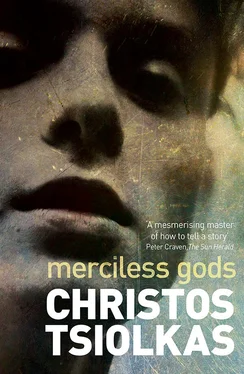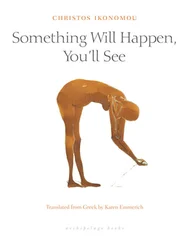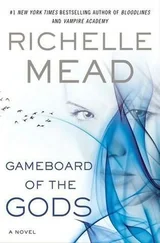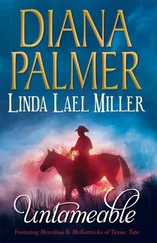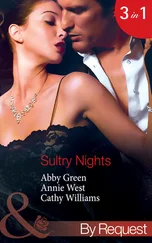I place the newspaper on the bed. He glances up from his seat by the window and then quickly looks away. I know when I have left he will pick it up and turn straight to the sports section. The news of the world, the news from Australia, also scares him. But he remembers that he follows the Collingwood Football Club. He remembers that.
‘I am your son David,’ I repeat. ‘I am Sophie’s brother. And Sophie has just had another baby — you’re a grandfather again. His name is Nicholas. Sophie has named him after you.’
The old man is still staring out the window. He won’t look in my direction.
I wish Sophie was here, I wish my mother was here. My sister talks to our father as if he was another one of her children; my mother refuses to believe that her husband doesn’t know who she is, that forty years of marriage and sharing a home and arguing and raising children and sleeping together and loving each other can be erased from memory. She tells him what their neighbours are doing, what their grandchildren are saying, what they do at school, where they went on their holiday. She stares at his vacant expression and refuses to see the panic it is masking; she doesn’t see his struggle to resist the terror of this stranger invading his room, this woman who won’t stop babbling at him. What she sees is the man she married; she sees the man she loves.
I usually make sure to visit when Sophie or my mother are there, when I can stand in the corner and watch them chatter away over him, adjust his bed, wash him, feed him. The times he gets angry, his moments of fury, when he screams at them, throws his tray across the room, shouts at them to fuck off, just fuck off, those are the times I can’t help but feel vindicated. That’s the father I remember, the father I know. He won’t play your game, I want to tell them, he won’t submit to being a child for you. He is a man; you women don’t understand that this is all that matters to my father: that he be a man.
But now, alone with him in his room, I find myself prattling, treating him as I would my nephews, or Mick’s godchild. ‘Looks like the sun will come out, don’t you think, Dad? Maybe we can take a walk outside.’ The bitter look he throws my way reflects the contempt I feel for the empty words I am saying.
I walk over to the window. The trees along the edge of the car park are spindly and denuded of leaves; spring has yet to touch them. As I pass him I place a hand on his shoulder and he slaps it away. I catch the overpowering reek of urine. Sometime after his morning feed the old man has wet himself.
‘Dad,’ I say, my voice shaking so much it ends up slipping into a higher register, ‘I am going to wash you; will that be okay?’
His head flicks towards me again but now there is relief. ‘Are you the new nurse?’
I nod. ‘Yes,’ I answer, ‘I’m the new nurse.’
•
All my life it was said of my father that he was a handsome man. And it was true: his was a ravishing beauty, accentuated by a virility that cleaved from it any hint of effeminacy. He was raised on the land, and even though he was only an adolescent when he came to the city to start his apprenticeship, he always made time to return to the bush. As youngsters every weekend would be spent out of Melbourne; we would follow him into steep ravines, walk for hours in the forests behind the Great Ocean Road. There were times when we walked so far, walked so long, that all I wanted was to sit down on a rock and weep. But I never did. I knew I had to be as tough as him, I knew he would never love me if I wasn’t as strong as him. So I walked: I walked with blisters on my feet, I walked in the burning sun; I walked in the drizzle, in the sleet and in the rain.
My mother, my sister and I had always lived in the shadow of his good looks. Not that my mother wasn’t herself attractive, or that Sophie and I were ugly. Quite the contrary. However, my father was the kind of man who could walk into a crowded room and draw every set of eyes to him. Wherever he was, he would be the centre of attention. There were moments when I witnessed women literally draw in their breath at the sight of him. It was also his good fortune to be possessed of a disarming larrikin charm, a natural gift for telling stories and jokes, and a speaking voice that was both melodic and of a rich baritone timbre. He entered the room and everyone turned his way; everyone wanted to be close to him, to be captivated by him.
I wouldn’t have been more than six or seven when I first became aware of the power of such beauty. It was in the middle of summer, a wretchedly hot day, and our parents had decided to take us to Mordialloc Beach. My father had taught us to swim when we were very young and one of my earliest memories was of giggling while he held me over gently lapping waves. He would often swim out far from shore, outdistancing the other swimmers, his strokes carrying him so far that my mother would rise from her beach towel and come to stand beside my sister and me to make sure that he had not completely disappeared from view, that she could still make out the faint speck of him on the horizon. A smile would spread across her face once she glimpsed him returning to us through the waves, his strokes measured and unforced, his outline slowly gaining shape and solidity. She would lie back on the sand, return to her book, and await the moment his shadow would fall across her, the sea water dripping onto her body as he stood over her towelling himself dry, his eyes ablaze with the pleasure of the swim. Sophie and I would look up to see him fall to his knees on the sand, kiss our mother’s shoulder, put on his sunglasses and lie down beside her in the sun. It was one of the most comforting sights of my childhood.
On this particular day an unexpectedly dramatic wave had run up the beach, terrifying Sophie and demolishing the sandcastle we had so carefully been building. My sister started to wail and I, confused, had looked towards my parents for guidance. My mother was upright, peering over her sunglasses and calling for Sophie to come to her. My sister had run to my mother and been swept into her arms, and I followed slowly. I might have been fearful that I was going to be punished for my sister’s distress. I was the older child, a position in the family that always felt laden with responsibility. But my father too had half risen from his towel, had taken off his sunglasses and was beckoning me to come over. He was smiling and I started to run towards him.
His right arm was raised, he was scratching the back of his head while the other hand was gently tousling Sophie’s hair as she burrowed further into my mother’s embrace. The hair under my father’s arm seemed shockingly abundant, chestnut in colour, glistening from sea and from sweat: possibly the jolt of it, it seeming so animal, so untamed, was what was so tantalising. The summer had tinted his skin bronze, his green-grey eyes were alert and shining and full of love for me. I had no language then to name what I was experiencing. All I knew was that the shock of my father’s underarm hair was blistering, that I felt knocked off my feet, that the sand and the sky and the sun were spiralling madly around me. So overwhelming were the emotions I was feeling, so ferocious this inexplicable need to touch him, to sink into him, to press myself against him, that there seemed only one thing I could do.
I walked up to my father and, mustering all the force I could, I punched him in the mouth.
The strike would have been wildly ineffectual, but there may have been a residue of fine sand on the underside of my palm, or the angle of my blow was such that a fingernail may have gone into my father’s eye; for once I struck him he let out a curse, an almighty holler, and bent over with a hand cupped to his left eye. His outrage started my sister off again on another bout of crying. Frightened, and with no idea of what I was doing, I began to run. I ran and I ran, the sand unyielding under my feet, burning my soles; but I kept running. Within moments I was conscious of my father behind me, of his shadow looming, gaining ground on me, and then of his arms scooping me into the air, holding me tight against his chest, of my mouth on his wet skin. ‘It’s alright, Davey,’ he was whispering, over and over, ‘it’s alright, son, I’m not angry.’
Читать дальше
